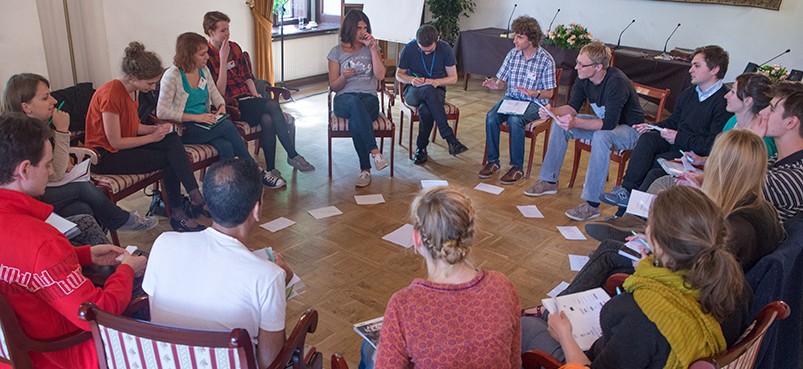
What could be more appropriate subject to a debate in Visegrad Summer School one and a half months after the European Parliament elections than drawing a lesson from its outcome? Find out how Visegradians perceive what happened to Europe in May.
Being only one and a half months after European Parliament elections Visegrad Summer School should not pass without discussing its outcome and the possible consequences of it. A (Polish) roundtable was formed from a journalist, a researcher and a political commentator to share their opinions and conclusions on the topic.
“Whoever you vote for, you get the same”
“I’m from the left, but I don’t think that populist parties will destroy the European Parliament” – said Michał Sutowski, polish political commentator and member of a polish left-wing think-tank, commenting the remarkable success of right-wing Eurosceptic parties in EP elections. Sutowski rather sees the problem in center-left and center-right parties reproducing the status quo by the rhetoric of “preventing the populist parties to destroy EU”. The presence of such populist parties also helps them to avoid the political reasoning of the crises, further reinforcing the current mood of average EU citizens that is: feeling “whoever you vote for, you get the same”.
“The European Parliament elections were more about the national governments of Europe rather than the European Parliament” – said Wojciech Przybylski, co-founder of Res Publica Nowa and Editor-in-Chief of Visegrad Insight, suggesting taking a look at the results of the countries of our region first. Reflecting to the lack of willingness in these countries to vote in EP elections, he added: “I would not call the low turnout of Central-Eastern European countries a deficit of democracy, it’s still legitimate.”
To have a hearable political voice in the European Parliament, Visegrad Group has to cooperate with Romania – said Marcin Kędzierski, researcher in political science, president of the Polish think-tank Jagellonian Club, drawing his opinion of V4’s possible position in the newly formed European Parliament. “We have different roles, potential and attitudes than Romania, but the coalition will be needed”- he added.
Visegrad foreign policy – who sets the goals?
“Visegrad Group has a special role in the history of political development” – started the second lecture of the day Zbygniew Krużyński, the national coordinator of Visegrad cooperation, Deputy Director of the Department of Regional Policy in the Polish Ministry of Foreign Affairs, explaining what the peculiarities of the cooperation are.
First of all, Visegrad cooperation has an informal character, meaning it has no structure managing the cooperation behind the governmental structure. Visegrad Group has no secretariat and no secretary general. “The cooperation with the aim of setting goals for our activities are based on the principle of consensus” – said Mr. Krużyński, introducing how the Visegrad cooperation works on a governmental level.
The political goals of V4, three main priorities being energy security, defense cooperation and infrastructure, are set through the institution of rotating V4 presidency and the regular meeting of the governmental level actors of the cooperation – told Mr. Krużyński, noting that these issues are in a different state of development, depending on how seriously the standpoints of respective countries differ from each other.
Eszter Neuberger














































